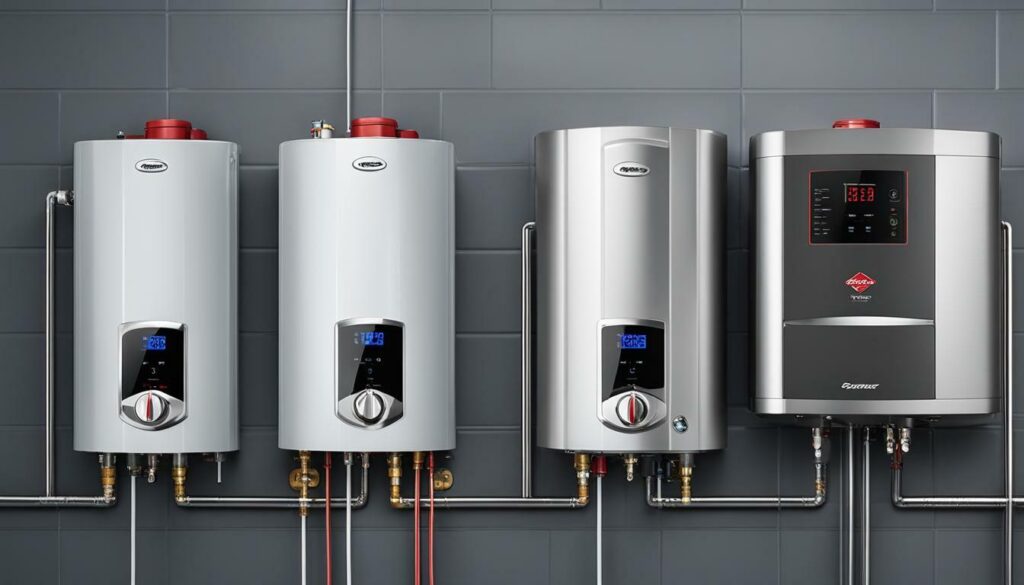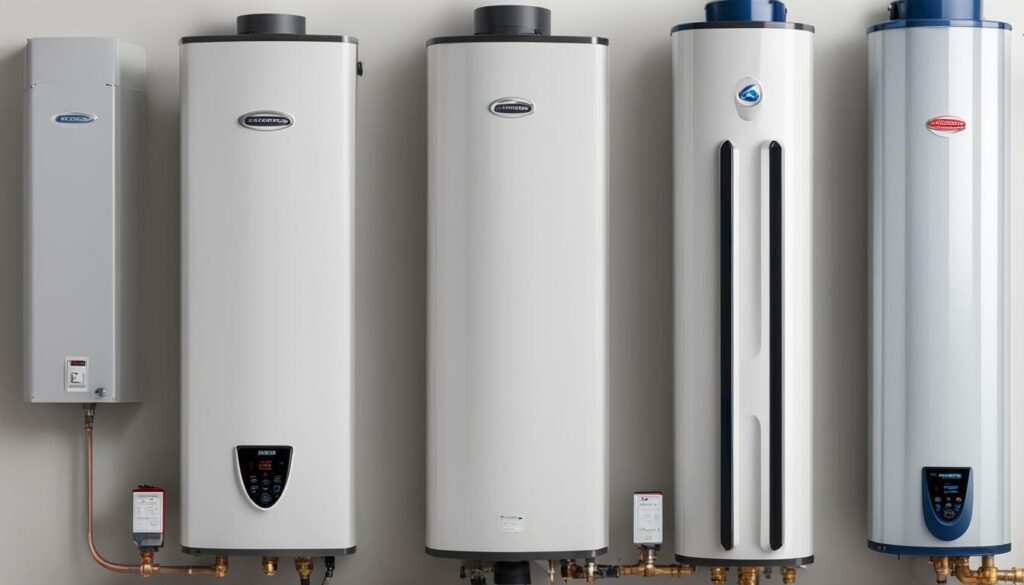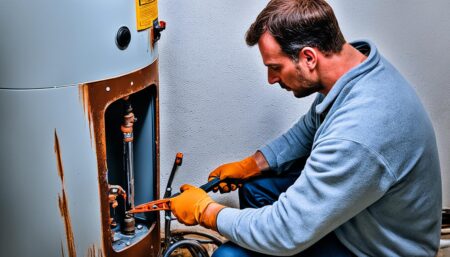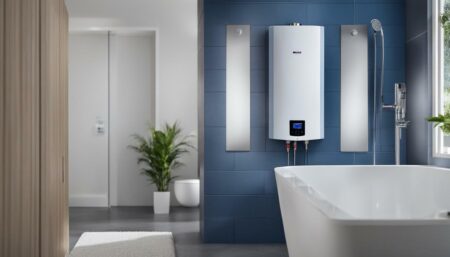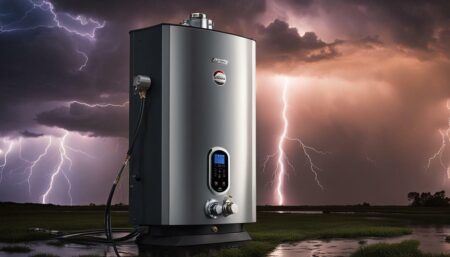Are you considering upgrading to a tankless water heater but unsure whether to go electric or gas? To help you make an informed decision, let’s take a closer look at the differences between electric and gas tankless water heaters.
Electric tankless water heaters use electricity to heat the water, while gas tankless water heaters use propane or natural gas. Both options have unique advantages and disadvantages, so weighing them carefully is important.
- Electric and gas tankless water heaters have different heating methods, which affect their effectiveness and efficiency.
- Cost is a significant factor to consider when deciding between electric and gas tankless water heaters, including installation and operating expenses.
- The environmental impact of these two options varies, depending on factors like energy efficiency and carbon emissions.
- Brand and model reliability is important to consider to ensure long-term performance and customer satisfaction.
- Ultimately, the best choice for your household depends on your specific hot water needs and preferences.
How Do Electric Tankless Water Heaters Work?
If you’re wondering how electric tankless water heaters work, you’re in the right place. These systems are designed to provide hot water on demand without the need for a bulky storage tank. Compared to traditional electric water heaters, tankless models are more energy-efficient and can help you save on utility bills in the long run.
The main difference between electric and gas tankless water heaters is the way they heat the water. Electric models use heating elements to warm the water as it passes through the unit. This process is controlled by a thermostat that regulates the temperature and ensures that the water is heated to your desired level.
When you turn on the hot water tap, the electric tankless water heater detects the flow of water and activates the heating elements. As the water passes through the unit, it is heated to the desired temperature and delivered to your faucet or showerhead.
Compared to gas tankless water heaters, electric models are typically smaller and more compact, making them an ideal choice for smaller homes or condos. They also have fewer maintenance requirements and are generally easier to install.
However, electric tankless water heaters may not be suitable for homes with high hot water demand. If you have a large family or frequently use hot water for activities like dishwashing or laundry, a gas tankless water heater may be a better option.
If you’re still unsure which type of tankless water heater is right for you, stay tuned for our comparison of electric and gas models in the following sections.
Gas tankless water heaters work by heating water directly through a gas burner as it flows through the unit. Unlike conventional tanks that store heated water, a gas tankless water heater heats water only when you turn on a faucet, providing you with an endless supply of hot water. Because gas tankless water heaters use natural gas or propane as fuel, they are typically more energy-efficient than electric models.
In a gas tankless water heater, a gas burner is ignited by an electronic ignition system when you turn on a hot water tap. The water then flows through a heat exchanger, which transfers heat from the burner to the water. As a result, the water exits the unit at the desired temperature, while the unused gas is vented outside through a flue.
Because gas tankless water heaters require a gas line and proper venting, installation can be more complicated than electric models. However, they typically have a longer lifespan and can provide more hot water at a higher flow rate compared to electric tankless water heaters.
| Advantages | Disadvantages |
|---|---|
| More energy-efficient than electric models | Require a gas line and appropriate venting |
| Longer lifespan | It can be more expensive to install |
| Ability to provide more hot water at a higher flow rate | It may not be suitable for households without access to a natural gas line |
If you’re looking for a gas tankless water heater, consider factors such as your household size, hot water needs, and budget. A professional plumber can help you determine which model is the best fit for your home.
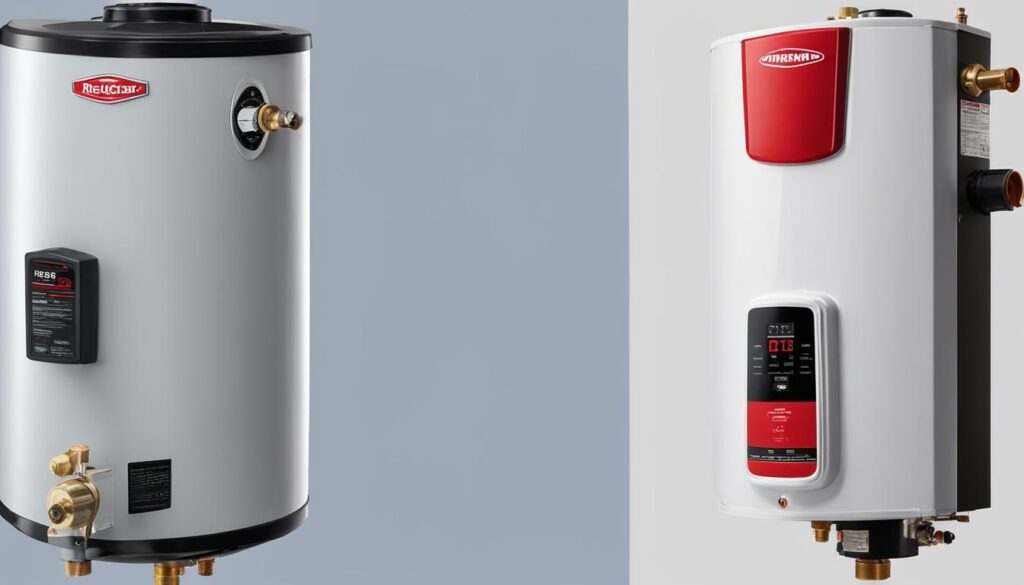
Electric tankless water heaters are highly effective, providing hot water on demand without the need for a storage tank. They work by heating water as it flows through the unit, eliminating the standby energy losses associated with traditional storage tank models.
Compared to gas tankless water heaters, electric models are generally more energy-efficient, converting nearly 100% of the electricity used into heat. This means lower operating costs and reduced environmental impact.
Another advantage of electric tankless water heaters is their compact size. They can be installed in smaller spaces, making them a great option for apartments, condos, and other areas with limited space.
However, electric tankless water heaters may not be suitable for households with high hot water demand, as they may struggle to keep up with the demand. In addition, they may require a higher electrical output than the household’s current electrical system can support, which can add to installation costs.
In summary, electric tankless water heaters are highly effective and energy-efficient, making them a great choice for many households.
The effectiveness of electric tankless water heaters can be influenced by several factors. One important consideration is the unit’s flow rate, which affects its ability to provide hot water on demand. Higher flow rates may result in lower temperatures and reduced effectiveness, so it’s important to choose a model with an adequate flow rate for your household needs.
The temperature of the incoming water supply can also impact the effectiveness of electric tankless water heaters. In colder climates or areas with colder water sources, the unit may need to work harder to raise the water temperature, resulting in decreased efficiency and effectiveness.
Another factor to consider is the quality of water in your area. Hard water can lead to mineral buildup in the unit, reducing its effectiveness and lifespan. Installing a water softener or descaler can help mitigate this issue.
Overall, electric tankless water heaters are a highly effective and efficient option for many households. By considering factors like flow rate, incoming water temperature, and water quality, you can select a model that meets your specific hot water needs.
Effectiveness of Gas Tankless Water Heaters
Gas tankless water heaters are highly efficient and offer a reliable source of hot water. They are known to provide a continuous supply of hot water without running out. Gas tankless water heaters heat water as it flows through the unit, eliminating the need for a storage tank. They are capable of heating water quickly and are ideal for households with high hot water demands.
Gas tankless water heaters are powerful and can accommodate multiple hot water sources simultaneously, such as a washing machine, dishwasher, and shower. They are often preferred over electric models in areas where natural gas is readily available because of their increased efficiency and lower operating costs.
One of the primary benefits of gas tankless water heaters is their ability to provide hot water at a constant temperature. They offer a consistent flow of hot water, ensuring that you never run out. Gas tankless water heaters are also more durable and require less maintenance than their electric counterparts.
However, gas tankless water heaters are not without their drawbacks. They can be more expensive to install initially, and they require proper ventilation to operate safely. Additionally, gas tankless water heaters produce carbon emissions, making them less eco-friendly than electric models.
Effectiveness of Gas Tankless Water Heaters: Pros and Cons
| Pros | Cons |
|---|---|
| Efficient and reliable hot water source | Higher installation costs |
| Continuous supply of hot water | Require proper ventilation |
| Capable of accommodating multiple hot water sources simultaneously | Produces carbon emissions and is less eco-friendly |
| Durable and requires less maintenance |
Overall, if you live in an area with access to natural gas and require a constant supply of hot water, a gas tankless water heater may be the right option for you. However, if you prioritize eco-friendliness and lower installation costs, an electric tankless water heater may better suit your needs.
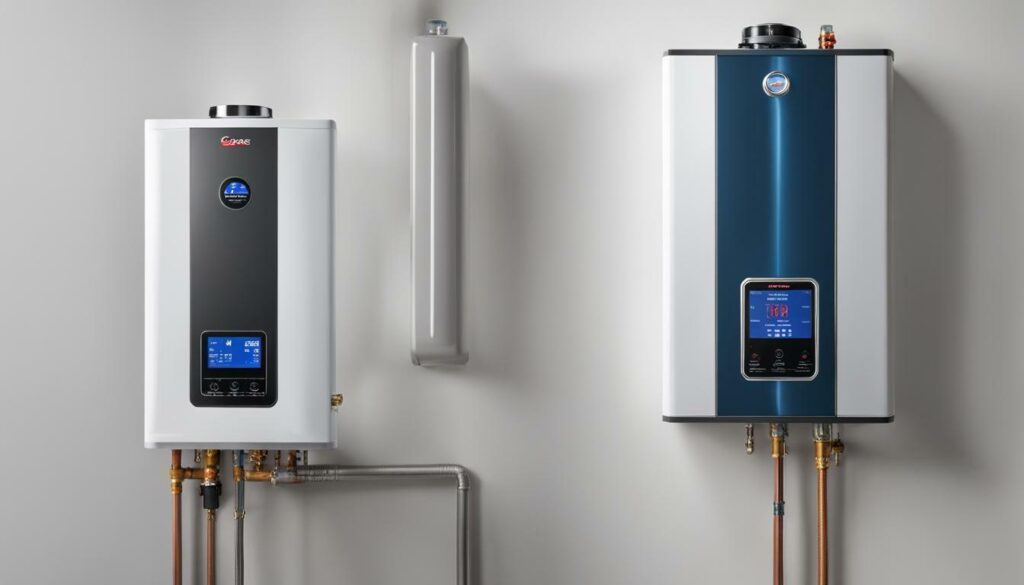
When it comes to cost, electric and gas tankless water heaters have different advantages and drawbacks. Let’s take a closer look.
| Expense Type | Electric Tankless Water Heater | Gas Tankless Water Heater |
|---|---|---|
| Initial Price | Electric tankless water heaters tend to be cheaper upfront, with models available for under $500. | Gas tankless water heaters can be more expensive upfront, with prices ranging from $1,000 to $2,000. |
| Installation Cost | Electric models can be easier to install, particularly if you have an existing electrical system in your home. You may be able to install an electric tankless water heater on your own, without the need for professional installation. | Gas models may require professional installation, which can add to the overall expense. Additionally, you may need to install new gas lines or venting systems, which can be costly. |
| Operating Costs | Electric tankless water heaters are generally cheaper to operate, as they do not require fuel and are more energy-efficient than conventional tank water heaters. However, electric rates may be higher in some areas, and the cost savings may not be significant for larger households. | Gas tankless water heaters can be more expensive to operate, as they require natural gas or propane fuel. However, if you have access to low-cost natural gas, this may be a more cost-effective option. Additionally, gas models tend to be more efficient at heating water, which can lead to lower operating costs over time. |
| Maintenance | Electric tankless water heaters typically require less maintenance, as they have fewer components and do not require fuel lines or combustion chambers. However, you may need to replace heating elements or sensors periodically, which can add to the expense. | Gas tankless water heaters may require more maintenance, as they have more parts that can wear out or malfunction. Additionally, you will need to have the system inspected periodically to ensure safety and efficiency. |
Overall, the cost comparison between electric and gas tankless water heaters will depend on factors such as your household’s hot water needs, energy rates in your area, and installation requirements. If you are looking for a more affordable option with lower upfront costs and maintenance requirements, an electric tankless water heater may be the best choice. However, if you have access to low-cost natural gas and need a higher-capacity system that can handle multiple hot water demands, a gas tankless water heater may be a more cost-effective option over time.
Electric tankless water heaters are becoming increasingly popular due to their energy efficiency and convenience. However, like any appliance, they have their pros and cons.
Pros
- Energy efficient: Since electric tankless water heaters only heat water as it is needed, they can be up to 98% energy efficient.
- Low maintenance: Unlike traditional water heaters, electric tankless water heaters have no storage tank to maintain or replace.
- Compact size: Electric tankless water heaters are small and can be installed in a variety of locations, such as under a sink or in a closet.
- Instant hot water: With no storage tank, there is no need to wait for the water to heat up. As soon as the tap is turned on, hot water is ready.
- Flexible installation: Electric tankless water heaters can be installed in any location with access to electricity, making them a versatile option for homes and apartments.
Cons
- Higher initial cost: Electric tankless water heaters can be more expensive to purchase and install than traditional storage tank water heaters.
- Limited hot water supply: Since electric tankless water heaters only heat water as needed, there can be limitations to the amount of hot water that can be produced at one time.
- Maximum flow rate: Electric tankless water heaters have a maximum flow rate, which can limit the number of fixtures that can be used simultaneously.
- Electricity requirements: Electric tankless water heaters require a significant amount of electricity to operate and may require a dedicated circuit.
Overall, electric tankless water heaters are a great option for those who prioritize energy efficiency and convenience. However, when deciding whether to go with an electric or gas tankless water heater, it’s important to consider factors such as cost, hot water needs, and installation requirements.
When it comes to selecting between electric and gas tankless water heaters, there are several factors to consider. While both options have their advantages and disadvantages, your choice will ultimately depend on your household’s needs and preferences.
Pros of Electric Tankless Water Heaters
One significant advantage of an electric tankless water heater is that it does not require a fuel source like gas, making it more environmentally friendly and cheaper to operate. Electric models are also generally smaller and more compact than gas models, making them easier to install and maintain. Additionally, there is no risk of carbon monoxide poisoning associated with electric models.
Another positive aspect of electric tankless water heaters is their lower upfront costs. They are more affordable than gas models and do not require any additional venting or gas line installation, which can add to the overall cost of a gas tankless water heater.
Cons of Electric Tankless Water Heaters
One of the primary drawbacks of electric tankless water heaters is their lower heating capacity when compared to gas models. This means that they may not be suitable for larger households or those with high hot water demand. Additionally, electric models may take longer to heat water than gas models, which could result in longer wait times for hot water.
Pros of Gas Tankless Water Heaters
One of the key advantages of gas tankless water heaters is their high heating capacity, making them ideal for larger households or those with high hot water demand. Gas models can heat water much faster than electric models, providing virtually instant hot water.
Gas tankless water heaters are also very energy-efficient, which can translate into cost savings over time. They have a longer lifespan than electric models and can provide hot water even during a power outage.
Cons of Gas Tankless Water Heaters
One of the main drawbacks of gas tankless water heaters is the higher upfront cost, which includes venting and gas line installation. They are also typically larger and more bulky than electric models, which can make installation and maintenance more difficult.
Another disadvantage of gas tankless water heaters is the risk of carbon monoxide poisoning if they are not properly vented. There is also a potential for gas leaks, which can be dangerous if not detected early.
Ultimately, it is important to weigh the pros and cons of both options carefully before making a decision. Factors such as household size, hot water demand, and budget will play a significant role in determining which type of tankless water heater is right for you.
When deciding between electric and gas tankless water heaters, there are several factors to keep in mind.
Firstly, consider the installation requirements. Electric tankless water heaters are generally easier to install as they do not require a gas line or venting system. Gas tankless water heaters, on the other hand, require professional installation and may require additional expenses for venting.
The availability of fuel sources is also an important consideration. If your home has access to natural gas, a gas tankless water heater may be more practical for you. However, if natural gas is not available in your area, an electric tankless water heater is a better option.
Your specific household needs will also play a role in your decision. If you have a larger household with high hot water demand, you may need to choose a gas tankless water heater for its increased heating capabilities. However, if you have a smaller household with lower hot water usage, an electric tankless water heater may be sufficient.
It is also important to consider the overall cost of ownership when comparing electric and gas tankless water heaters. While electric models may be cheaper upfront, they may have higher operating costs in the long run. Gas models may be more expensive to install, but they could save you money on energy bills.
Lastly, consider the environmental impact of your choice. Electric tankless water heaters produce zero emissions, making them a more sustainable option than gas models. However, gas tankless water heaters are becoming more energy efficient and may produce fewer emissions than traditional tank-based models.
By weighing these important factors, you can make an informed decision between electric and gas tankless water heaters that best fits your household’s needs and budget.
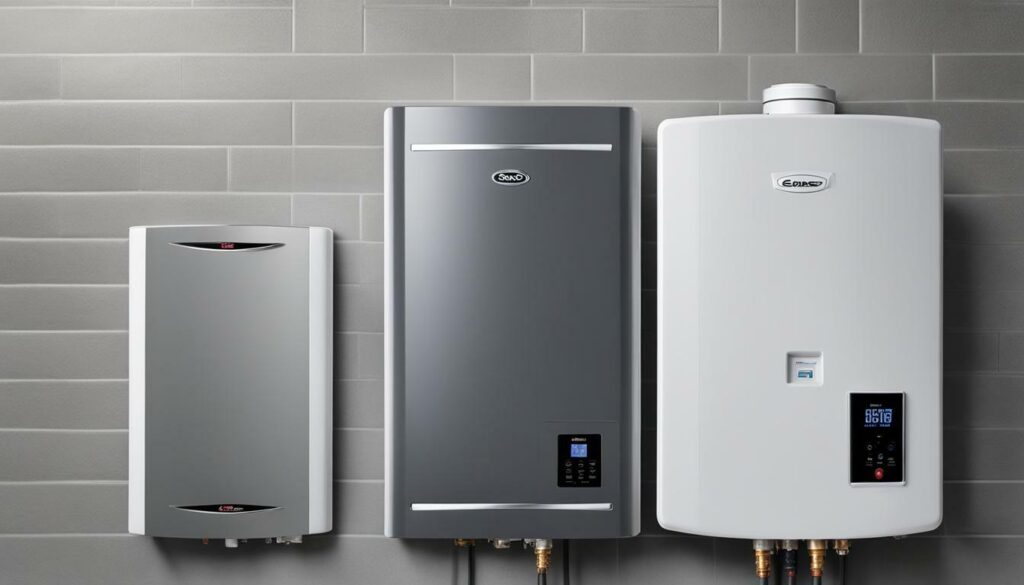
When it comes to the environment, both electric and gas tankless water heaters have their advantages and disadvantages.
Electric tankless water heaters are generally considered to be more energy-efficient than gas models. They consume less energy to produce hot water, which means they have a smaller carbon footprint. Additionally, electric heaters do not emit any greenhouse gases during operation, making them a cleaner option.
Gas tankless water heaters, on the other hand, do emit greenhouse gases during operation. However, they can still be considered environmentally-friendly because they consume less water than traditional tank water heaters. This is because they only heat water on demand, thereby reducing the amount of water that needs to be heated and stored.
When it comes to overall sustainability, electric tankless water heaters may have the upper hand. As renewable energy sources become more prevalent, electric heaters can be powered by clean energy, reducing their environmental impact even further.
Ultimately, the environmental impact of your water heater will depend on a variety of factors, including your location, energy source availability, and usage habits. However, both electric and gas tankless water heaters offer environmentally-friendly options for heating your water.
“As renewable energy sources become more prevalent, electric heaters can be powered by clean energy, reducing their environmental impact even further.”
Reliable Brands and Models of Electric and Gas Tankless Water Heaters
When buying a tankless water heater, it’s important to choose a reliable brand and model that will provide the hot water you need when you need it. Here are a few brands and models that experts and customers highly recommend:
Reliable Electric Tankless Water Heater Brands and Models
| Brand | Model | Key Features |
|---|---|---|
| Rheem | RTEX-13 | Compact design, easy installation, digital temperature control |
| Stiebel Eltron | Tempra Plus 24 kW | Advanced flow control, digital temperature display, energy-efficient design |
| Ecosmart | ECO 27 | Self-modulating technology, digital temperature control, lifetime warranty |
These electric tankless water heaters provide efficient performance and are suitable for various household needs. They are also affordably priced, making them a great investment.
Reliable Gas Tankless Water Heater Brands and Models
| Brand | Model | Key Features |
|---|---|---|
| Rinnai | RUC98iN | Efficient and powerful condensing technology, Wi-Fi connectivity |
| Takagi | T-H3-DV-N | High flow rate, energy-efficient design, safety features |
| Noritz | NR981-SV-NG | Compact and easy to install, energy-efficient, digital temperature control |
Gas tankless water heaters are a great option for those who need a powerful and efficient hot water system. These models from Rinnai, Takagi, and Noritz offer advanced features and reliable performance.
When choosing a brand and model of electric or gas tankless water heater, it’s important to consider your specific household needs and preferences. Do your research and read customer reviews to make an informed decision.
Conclusion
Choosing between an electric or gas tankless water heater can be a daunting task, but we hope this guide has provided you with the information you need to make an informed decision.
Electric tankless water heaters are generally less expensive and easier to install, making them a great choice for smaller homes with lower hot water demand. They are also more environmentally friendly, producing fewer emissions and consuming less energy.
On the other hand, gas tankless water heaters are more expensive to install but can handle higher hot water demand. They are ideal for larger homes with higher hot water demand and can provide consistent hot water even during power outages.
Factors to Consider
When choosing between electric and gas tankless water heaters, it is essential to consider factors such as installation requirements, availability of fuel sources, and your specific household needs.
If you live in an area with limited access to natural gas or propane, an electric tankless water heater may be your best option. A gas tankless water heater may be the better choice if you have a larger home with higher hot water demand.
The Best Brands and Models
Several reliable brands and models of electric and gas tankless water heaters are on the market. Some popular brands include Rheem, Rinnai, and Bosch. It is essential to do your research and read customer reviews to determine the best fit for your home.
Choosing the right tankless water heater for your home depends on your specific needs and budget. Consider the factors outlined in this guide and do your research to make the best decision for your household.



